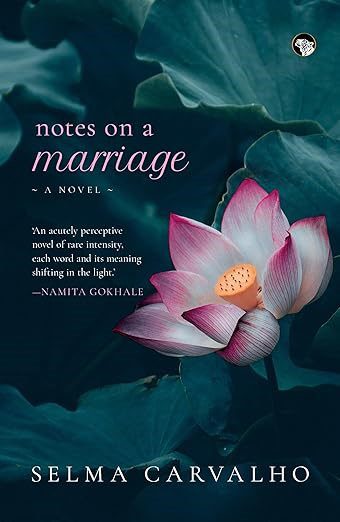
Title: Notes on A Marriage
Author: Seema Carvalho
Genre: Fiction/ Novella
Language: English
Publisher: Speaking Tiger
Year: 2024
Pages: 160
Price:INR 296.00
ISBN No: 978-9354477072
A girl raised in Britain in the skin of an Indian. A girl who is irrelevant to, unloved and unrecognised by her father. A girl who wanders around without a sense of belonging, and desperately longing for it. What does she do when a person takes a chance on her and invites her to his space? She imprints on the person, silly!
Selma Carvalho’s novella Notes On A Marriage is set in Horton, London. It explores the married life of its protagonist Anju and Freddo vis-a-vis the married life of Anju’s parents, a disillusioned Indian Marxist father and a submissive British mother. Anju’s father is a man of many words, an ardent follower of Ambedkar and Orwell before the Conservatives took him. Orwell’s betrayal loomed heavy on his heart. Every time he spoke of the Marxist revolution, he projected on Anju, his failure to stay in India, constantly criticizing her as a child incapable of understanding his politics.
When Anju joins William Byrd University, she meets Freddo (Alfred Hughes), Nido (Nitesh) and Ginny (Eugenia) who hail from the working class and have strong morals to fight for their rights. Eugenia, a student of Philosophy, is well-versed in the works of Slyvia Plath. She is confident and opinionated and doesn’t hesitate to call out Freddo’s womanising habits and Anju’s privileged upbringing that makes her an outsider in their discussions on communism.
Freddo invites Anju into their space by sitting down to explain to her, their politics – something her father never did. The gratitude that she feels turns into life-long loyalty despite the unfortunate event that ties them together in marriage, a marriage based on wordless guilt. She entrusts him to keep her safe from the world.
One is bound to ask, how does the world threaten her existence?
The answer lies in her very Asian skin which betrays her British upbringing and sensibilities. Eternally stuck in the in-betweenness of her mixed parentage, she belongs only to Freddo. Tied in a marriage, both Anju and Freddo long to start a family to make up for the ones they never had, to love a child like the love they longed for in their childhood—the love of two parents.
Carvalho’s slow-burn novel interrogates the monogamy in marriage. Her characters showcase no remorse for their multiple affairs or love outside of marriage. They do not walk out of such a marriage either. The marriage and affairs co-exist without conflict, with resentment. The book also reiterates the age-old sensibility that a family is formed by children irrespective of how detached the partners might be. Anju’s parents are so different in their interests that her mother concludes, “they might as well all be living on different planets”.
Using lyrical prose, Carvalho dwells on the patriarchal practice that establishes a woman’s power in marriage through her pregnancy. She sticks to the gender roles that confirm that it is a woman’s job to keep sinking low, endure, and survive as men continue to drift away. It puts the burden on the child to save a marriage because parents come together to love the child even though their love for each other has exhausted itself.
Filled with many poignant insights on regret, parent-child relationships, marriage, and life, Notes on a Marriage leaves the reader in turmoil. Can people in such twisted marriages survive through the years? Can they truly forgive and move forward? Is it yet another performance? One begins to wonder, where does one, especially a woman with low self-worth, draw a line between what is forgivable and what isn’t when she denies having a life beyond her husband? A striking passage from the book, touches on these questions,
“Who can say with absolute clarity what saves a marriage, this swamp of emotions, this labyrinth of desires, it survives, even when it is tearing at the seams, bursting with unhappiness, even then it is still sewn together by a lifetime of error and correction, of regret and regeneration, of love and friendship. Marriage has the infinite ability to grow back with deeper roots each time its cut down.” (139)
The beautifully strung-together passages with the undertones of the Plath-Hughes marriage call for admiration. They do not try to hide the ugliness that seems to be unfolding. The novel brings forth a sense of claustrophobia as the reader navigates through the pages, urging the protagonist to let go, break free, and choose a happy life without waiting, perhaps, for her husband to pass away.
And yet, Selma Carvalho lucidly portrays the rippling effects of marriages bound by guilt and a desire to rewrite one’s childhood. A guilt that is so deep in their bones that walking away from each other will be construed as the most profound betrayal, and the desire is so strong it washes off the guilt to become all that they never had for their child.
In the end, the reader returns to the title, grateful that this is after all notes on ‘a’ marriage.
Akankshya Abismruta is a creative writer and independent book reviewer. Her works are published on various digital and print media platforms.

Subscribe to our newsletter To Recieve Updates
Join our newsletter to receive updates